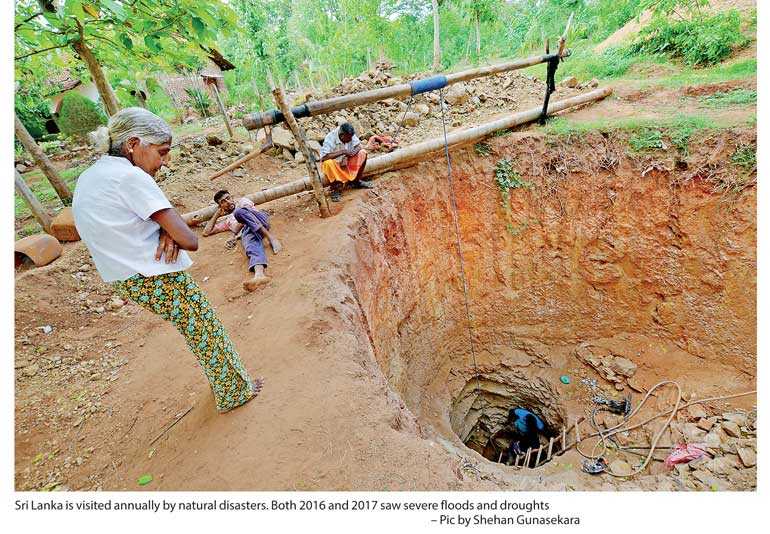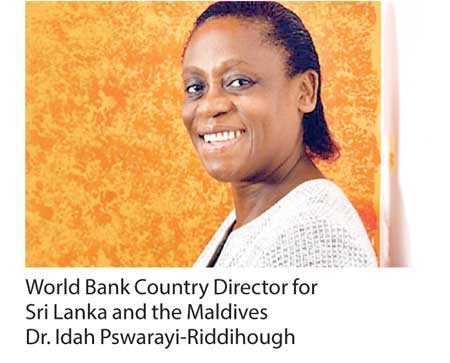Saturday Feb 21, 2026
Saturday Feb 21, 2026
Wednesday, 26 September 2018 00:00 - - {{hitsCtrl.values.hits}}

 Following is the address by World Bank Country Director for Sri Lanka and the Maldives Dr. Idah Pswarayi-Riddihough at the opening of the Sri Lanka Adaptive Social Protection Conference yesterday
Following is the address by World Bank Country Director for Sri Lanka and the Maldives Dr. Idah Pswarayi-Riddihough at the opening of the Sri Lanka Adaptive Social Protection Conference yesterday
Honourable State Minister of Finance and Mass Media Eran Wickramaratne, honoured guests, visiting delegates, ladies and gentlemen. On behalf of the World Bank, good morning and welcome to this conference on Adaptive Social Protection.
Sri Lanka is the envy of many countries in its income and development bracket. It has reduced extreme poverty to below 1%, and poverty at the present national poverty line is now down to 4.1%. The key concerns for Sri Lanka are less about extreme poverty; and more about vulnerability to an array of risks. Depending on the level of vulnerability, progress can be undone.
This is the key reason why this conference is focusing on one major risk that all living in Sri Lanka are acutely aware of. Disaster risk.
Sri Lanka is visited annually by natural disasters. Both 2016 and 2017 saw severe floods and droughts. According to a recent World Bank report launched last week in Colombo, rising temperatures and changing monsoon rainfall patterns from climate change could cost Sri Lanka 7% of GDP and depress the living standards of nearly half the country’s population by 2050. These events have an enormous impact on those who are directly affected, and the impacts are felt indirectly by all of us.
We estimate that 5.7% of the population is at risk of falling into poverty if a shock reduced their income by 20%. By taking lives, destroying assets and interrupting business activities, disasters are quite capable of adding measurably to the number of poor.
Sri Lanka has put in place extensive programs to respond to disasters. While the Government and development partners are now increasingly able to forecast disasters and provide immediate assistance to those affected, more can be done to coordinate these efforts and ensure that disaster-affected households are supported until they fully recover.
This is where adaptive social protection can play a role. Adaptive social protection comprises a series of measures to protect the poor and the vulnerable from disasters. These are measures to become more resilient as communities.
Adaptive social protection is not just about money it is also about social assistance and services, such as cash transfers, social insurance, like pensions and disability benefits; and active labour market programs. If they are designed and run well, these programs can cushion the blow of unexpected losses such as those brought about by disasters.
Information systems are playing an increasingly pivotal role worldwide in directing and coordinating governments’ responses to those in need. With support from the World Bank, Sri Lanka is developing a social registry, which is a database containing details on the needs and conditions of citizens.
Currently there are 35 programs implemented by 11 ministries, each with its own rules and processes and no coordination, reducing their impact and efficiency. A social registry can help various programs to determine who needs the most help in a systematic and objective way. The social registry can play a key role in responding to disasters, too, by helping the government and other agencies to identify who is affected, what their needs are, and what programs they already receive.
Today and tomorrow, we will hear from representatives of countries that have taken on this challenge, using increasingly sophisticated social registry and welfare systems to provide rapid assistance to disaster-affected citizens. I would like to thank them for travelling here to share their experiences. It is our hope that Sri Lanka can, in the years to come, lead the way for other countries by sharing its experiences developing and implementing a truly adaptive social protection system.
I would like to thank our sponsors for today’s event, the French Development Agency (Agence Française de Développement) and the Rapid Social Response Trust Fund (financed by the governments of the Russian Federation, Norway, the United Kingdom, Australia and Sweden, and the GFDRR (Global Facility for Disaster Risk Reduction). I would also like to thank the officials at the Department of National Planning for hosting this event.
Again, a very warm welcome to this conference. I hope the next two days are a chance to learn, discuss, and envision a future in which no one needs fear falling into poverty as the result of a disaster.